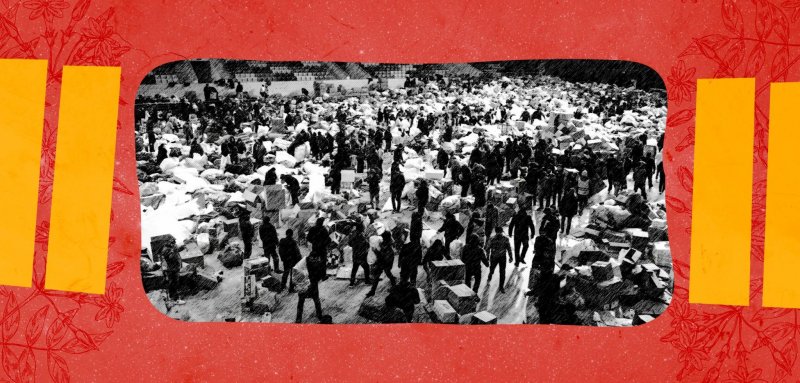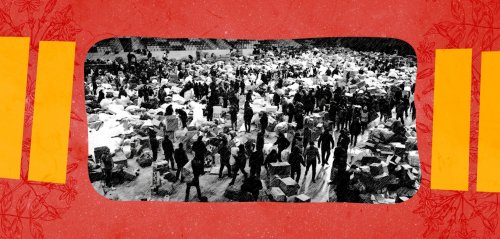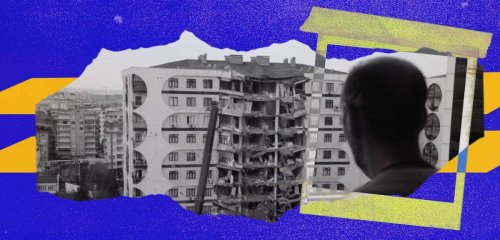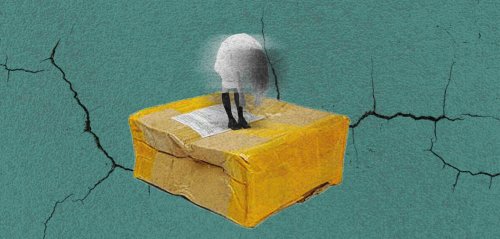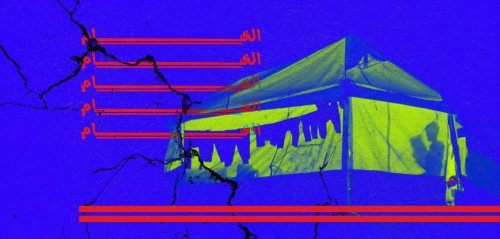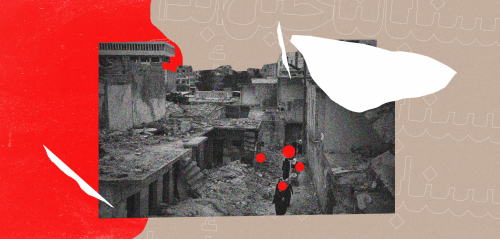A 7.8 magnitude quake shook the already war-stricken land before the natural calamity came, creating one of the most horrific and deadliest natural disasters in the region in hundreds of years. It turned everything into rubble, ruin and remains of buildings, as well as the remains of humans who have been left with nothing to say other than: “We have become lumps of flesh and blood, and our souls have crumbled and departed with the rubble.”
Only one structure remained sturdy and solid, one that even the moving plates of the earth could not rock. How could they, when it was born of a fierce 12-year-long war, drew its toughness from the woes of war, and watered its roots from its blood, and became a cancer that kills those afflicted and increases the affliction with more affliction, throughout its history.
Political hatred is the cancer that was able to find an opening in the cracks of homes, making its way through them until it reaches disaster, and throwing them into the filth of politicization – the politicization of everything; aid, rescue teams, regions, and even blood.
The slogan “politics aside" has transformed into a strategy of action aimed at saving and rescuing the afflicted first without regard to any political alignments or backgrounds
"Leaving politics aside" is a humanitarian cry, reinforced by the duality of the world relief sent to Turkey and Syria, and the timid Arab support for a fellow country amid a crisis of not being able to reach the north, which is outside the control of the state, but others shifted the phrase "politics aside" from a slogan to a strategy of action aimed at saving and rescuing the afflicted first without regard to any political alignments or backgrounds.
In Europe, this human elite force was present in many gatherings, embraced by Arab communities, and its main goal was to collect financial and in-kind aid and send it to Syria and Turkey, in order to support the people of both countries after the disaster that befell them.
What was remarkable during these campaigns were scenes that exceeded the effects of the Syrian crisis; everyone of all kinds of affiliations came together and stood in one line in support of the afflicted country, according to volunteers in the campaigns.
Belgian Caravans
"At the beginning, we called on the Syrian community, but were met with an Arab uprising from all communities that came to support the afflicted in Syria and Turkey." Youssef Koweika, 32, a volunteer in Belgium helping the afflicted, said. "We collected financial and in-kind aid from volunteers and organizations, and sent it to Syria and Turkey, while ensuring that it reaches the afflicted without paying attention to any regional or political considerations," he added.
Youssef and his fellow Arabs and Turks sent several convoys of aid to Antakya and Syria, collected from the generous donations of people, some of whom donated by deducting a sum from their monthly income or savings, while others brought over items and necessities from their homes, and in Belgium some commercial events allocated a portion of their profits to help the earthquake victims.
"For the first time I see the son of Jableh in Latakia helping the son of the Syrian north, and the Kurdish aiding the Turkish.. and even the Turks and Syrians who were at odds and opposed each other, came together and started working hand in hand"
Berlin Operations Room
In Germany, voluntary youth groups formed an operations room and launched a mission to provide relief to the afflicted in the affected areas and provide them with logistical support on the one hand, and collected aid to be sent to the affected cities through embassies and international organizations, on the other.
"For the first time I see the son of Jableh in Latakia helping the son of the Syrian north, and the Kurdish aiding the Turkish," Turku Taciurik, 31, a Turkish young lady, describes to Raseef22 what took place in Berlin during the relief work. She adds, "My friends and I stopped our work completely, and we came to work here in the operations center, collecting clothes, sorting, dividing and packing aid, in addition to providing first aid kits, and with us were Syrians from all the German cities, and all the backgrounds far from political alignments, and even the Turks and Syrians who were at odds and opposed each other, came together and started working hand in hand."
Calamity has brought us together
In Budapest, Louay, 41, experiences every day the pain of being away from his stricken city of Aleppo, and does not miss any opportunity to provide relief to its people. He rushes to attend an assembly council here and then a religious mass to support the afflicted there. "I wasn't ashamed to urge all my friends and acquaintances here in Hungary, whether Arabs or Hungarians, to donate, and I found that there are many others like me, and we now work as one body, doing our part from here," he says.
"Calamity has come back to bring us together. We communicate every hour with the Syrians in Syria, and our distance from Syria makes the impact of the disaster even greater, unlike what many believe" – Louay, 41, a Syrian living in Budapest
Raseef22 met Louay after a mass at the Rózsák Tere Görögkatolikus Church in Budapest. The mass was being held to provide relief to the afflicted in Syria and collect aid for them. Louay spoke about the pain of being far away from his family and the city of Aleppo, of which he memorizes the smallest details and has a spiritual relationship with, adding, "Calamity has come back to bring us together. We communicate every hour with the Syrians in Syria, and our distance from Syria makes the impact of the disaster greater, unlike what many believe."
The holy mass in Budapest was presided over by Syrian priest Hanna Ghoneim, who came from Austria to call on worshippers to donate to stricken Syria and to oversee aid collection operations in the Hungarian capital. He tells Raseef22, "We have collected large amounts of aid to deliver it to Syrians in all regions. Every effort in the interest of the afflicted is welcome, regardless of gender, race or political orientation, and the beautiful thing that happened is that all this is stirring up the feelings of Europeans and mobilizing public opinion in Hungary, Austria and all European countries to help and donate to the victims." He adds, "The disaster was an opportunity for us Syrians to gather on love and brotherhood without thinking about any sectarianism or regionalism, and we were able to take advantage of this opportunity and all we have to do now is ensure smooth and proper work operations and the delivery of aid and support to those who deserve it wherever they are."
"We collected large amounts of aid to deliver to Syrians in all regions. Every effort in the interest of the afflicted is welcome, regardless of race or political orientation. This is mobilizing public opinion in all European countries to help the victims"
With these words, Father Ghoneim ended his sermon by addressing the Syrians and Arabs in Hungary, calling on everyone to do their part to heal the wounds of the people, to the satisfaction of God and the country.
Reviving the Arab spirit
The Arabs of Europe have restored some of the luster of the "Arab spirit" that had been lost in the dust of wars and diaspora. They came together to join efforts away from politics, regions and references, in support of humanity above all.
Raseef22 is a not for profit entity. Our focus is on quality journalism. Every contribution to the NasRaseef membership goes directly towards journalism production. We stand independent, not accepting corporate sponsorships, sponsored content or political funding.
Support our mission to keep Raseef22 available to all readers by clicking here!
Interested in writing with us? Check our pitch process here!
